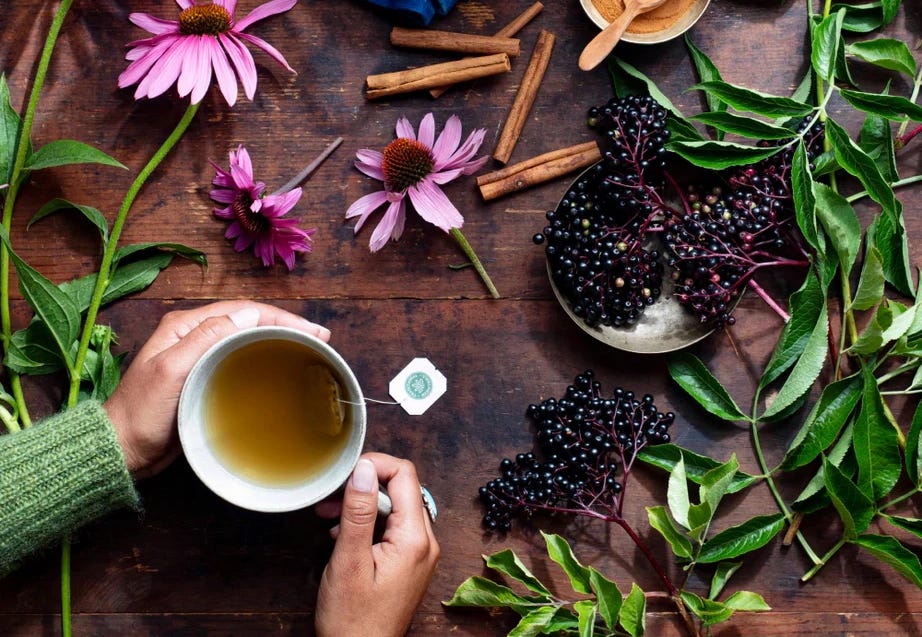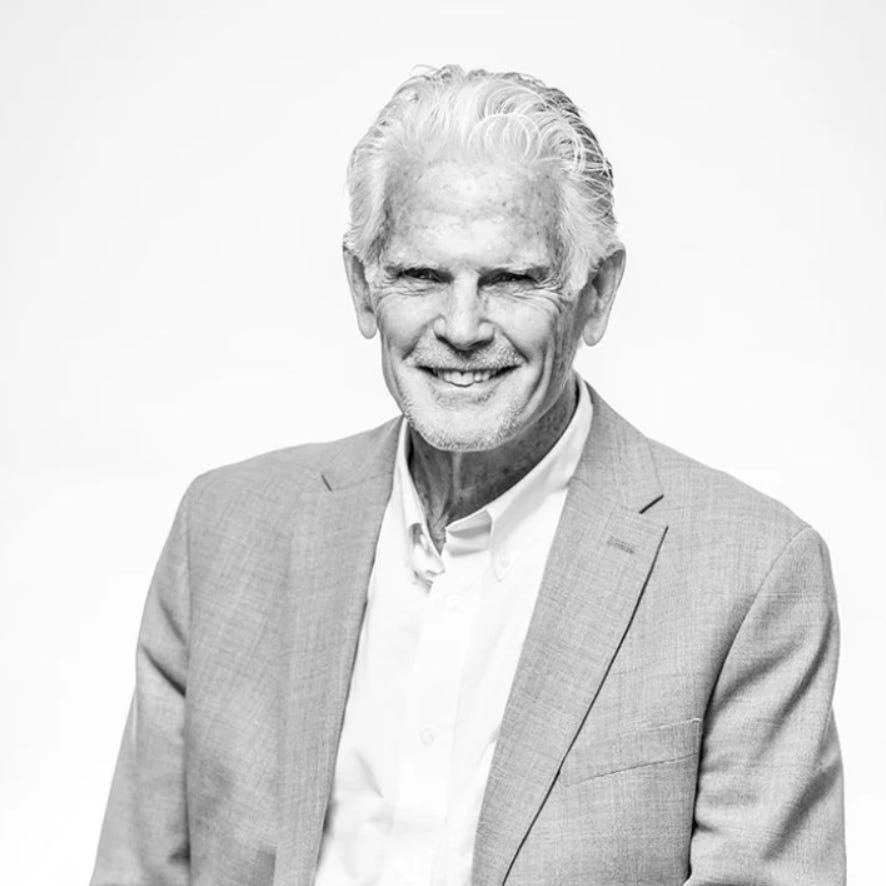Herbal tea company Traditional Medicinals turns 50
A Q&A with co-founder Drake Sadler

Botanical wellness company Traditional Medicinals, world-renowned for its organic herbal teas, lozenges and capsules, turned 50 this year. In 1974, community activist Drake Sadler and herbalist Rosemary Gladstar launched Traditional Medicinals, a medicinal herbal tea company, with the goal of reviving herbalism in North America. Traditional Medicinals relocated to a 10-acre campus outside of Graton in the 1980s and moved again to property in Rohnert Park in 2016. The company has played a seminal role in the development of the modern herbal remedy industry.
While many Americans recognize the brand for its 60-plus organic teas, few may realize that the company has also played, and continues to play, a significant role in investing in herbal-supply communities worldwide. In addition, its website offers several comprehensive botanical educational resources, including an online Herbal Library, an herbal education video series called Plant Wisdom Collective and more.
In 2024, Traditional Medicinals “served” 782,276,544 bags of tea and was voted “Best Place to Work” by the North Bay Business Journal. In its own words, Traditional Medicinals seeks to “improve our partner-centered, people-first approach to produce an engaged, vibrant community.”
Its chief science officer, Taryn Forrelli, summed up one of the company’s core beliefs with the words: “Plants are the original medicine.”
The Sebastopol Times recently caught up with Traditional Medicinals co-founder Drake Sadler, who is the current chair of the company’s board of directors.
This interview has been lightly edited for clarity and brevity. Throughout this article, the company is referred to as Traditional Medicinals or the acronym TM.

The Sebastopol Times: What is your name and county of residence?
Drake Sadler: Drake Sadler, and I currently reside in Sonoma County, California. Thank you for allowing us to share our story.
Where did you grow up? Where have you lived and what path led you to start Traditional Medicinals?
I was raised in the redwoods of West Sonoma County in our family’s cabin in SummerHome Park and attended Forestville Elementary School. My teen years were spent in Southern California and Saltillo, Mexico, as a foreign exchange student.
In my early 20s, I returned to Sonoma County in 1968 when the back-to-the-land movement saw young people exiting cities and migrating to the country. Out of college, I worked for People For Economic Opportunity, helping establish anti-poverty social projects in underserved local communities. Fueled by a passion for social activism, the experience of community empowerment shaped my understanding of how systemic change happens through purposeful work.
In 1970, I met Rosemary Gladstar, a fourth-generation herbalist whose family had passed down the knowledge of traditional plant medicine. Raised in Sebastopol, Rosemary was well known in West County, operating a small herb shop — the original Rosemary’s Garden — in Guerneville. Serving the community through herbal education, the popularity of her natural remedies (medicinal herb formulas) expanded beyond the region.
Why did you found Traditional Medicinals?
Well, actually, both Rosemary and I feel like the company found us. Traditional Medicinals (TM) was an organization whose time had come, and the convergence in 1974 of Rosemary’s deep herbal wisdom and my interest in community development provided the expertise and resources Traditional Medicinals needed.
The company was founded on two core purposes. The first was herbal education. Rosemary wanted to share the herbal knowledge that had been carefully preserved in her family, and she recognized that the products — and the printed herbal information we put inside — could be a powerful educational platform to teach people about plant medicine.
The second purpose became clear as we began visiting herb-supply communities around the world where medicinal plants are cultivated and collected. We discovered that these remote communities, in places like India or Guatemala, faced significant challenges, including access to education, limited health and social services, food and water insecurity, economic hardship and poor working conditions. We concluded that building sustainable supply communities was essential to all the company’s stakeholders and its success.
Aligned with purpose, very early on, we agreed to a set of operating values and principles, including the Buddhist principle of “right livelihood.” By following these values and principles, and committing to certifications like organic and fair, we conduct business in ways that help people while causing no harm to consumers, communities, employees, animals and the environment. Fifty years later, our purpose and these principles are the guideposts and the guardrails for this fast-growing organization. Turns out, virtue pays healthy dividends.
What different roles have you played at TM over the years?
I have served in various leadership capacities throughout our five decades. Over the years, my role has evolved from hands-on operations — CEO for 30 years — to my current roles as chair of the board of directors and chief visionary officer (elder steward of our purpose, mission, values and vision). I love this work, and I’m very grateful to be able to provide value to TM.
What have you enjoyed most about founding and working for Traditional Medicinals?
I continue to be deeply moved by the impact we’ve had in supply communities. The products are actually just the means to an end, they provide the financial and human resources which allow us to scale this meaningful purpose. Today we work in 43 countries, and last year we invested $2.6 million in projects across the globe. Seeing entire communities, and in some places, multiple generations transformed with our support keeps me very humble and hungry.
I’m also very inspired by the next generation of passionate people at TM navigating this path. Pioneering the high road is a never-ending ascent, and they embrace these challenges. This work is rewarding, but it’s not easy, and all the staff creatively collaborate to solve complex problems made even more complicated by our size and growth. It’s fun to watch people being successful and enjoying each other’s company … our culture is quite exceptional.
How has Traditional Medicinals changed in the past 50 years?
The most significant change has been scale. We were first in a wellness category that is now becoming increasingly mainstream. North Americans consume 2 million cups of our tea every day, that’s like 23 cups every second 24/7/365. Traditional Medicinals is in 12 million households, making us the second-largest tea company in North America. Being in that many cupboards provides a powerful platform for education that we never imagined possible.
What are some major innovations or advancements that Traditional Medicinals has undergone over the decades?
In 1980, TM introduced the first organic herbs in commerce, and today we are the largest organic tea company in the world. In the mid-eighties, TM was awarded a drug manufacturing license by Food and Drug and introduced the first over-the-counter plant-based medicines in a tea bag. Forty years later, 300,000 health-conscious consumers make a cup of our best-selling laxative tea, Smooth Move, every day.
Demonstrating our commitment to ethical practices, TM adopted fair trade certification in the 1990s and is now the largest fair-certified tea brand in the world. TM has pioneered numerous animal protection certifications, including the Giant Panda Friendly certification in 2004 (protecting and restoring the panda population). TM became a B Corp-certified company [meaning it was verified by B Lab to meet high standards of social and environmental performance, transparency and accountability] in 2010, and we continue to lead industry initiatives like the BPI-certified compostable tea bag overwrap.
What are your thoughts about TM at its 50-year mark?
I’m filled with gratitude and optimism for our team, our partners, our consumers and our fragile planet. Together, we’ve demonstrated that conscious enterprise can achieve significant scale and impact. It’s also obvious that “business as usual” lacks the character required to solve present problems like climate change, social justice and sustainable resource management. Our 50th anniversary is a recommitment to being part of the solution.
What do you envision for Traditional Medicinals going forward?
Our plans extend well into the future. We will expand our global impact while staying true to our “roots.” Enlightened governance, perpetual purpose ownership, experienced leadership, ethical business practices, environmental stewardship, community empowerment and collaborative partnerships are essential to TM’s success. Those are the north stars.
The next 50 years will bring challenges and opportunities we can’t yet imagine. Companies like TM have shown that business can be a force for positive change. As conscious consumers, we must be mindful about the products we buy and organizations we support. Together, we are designing the future today.
For more information, visit traditionalmedicinals.com and traditionalmedicinalsfoundation.org.



